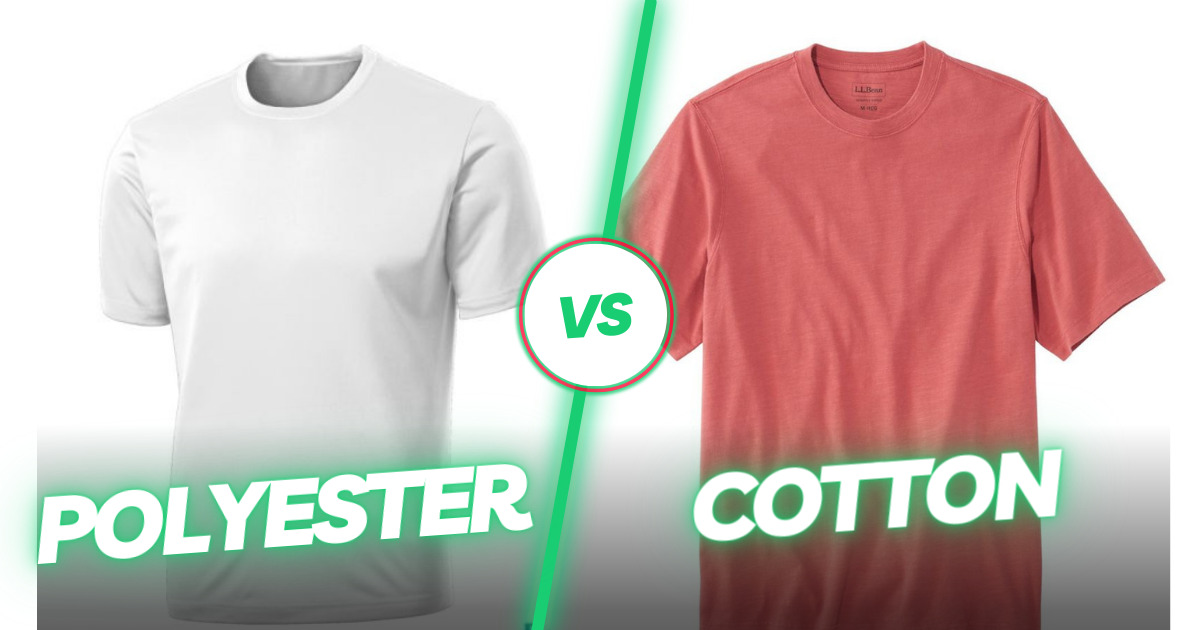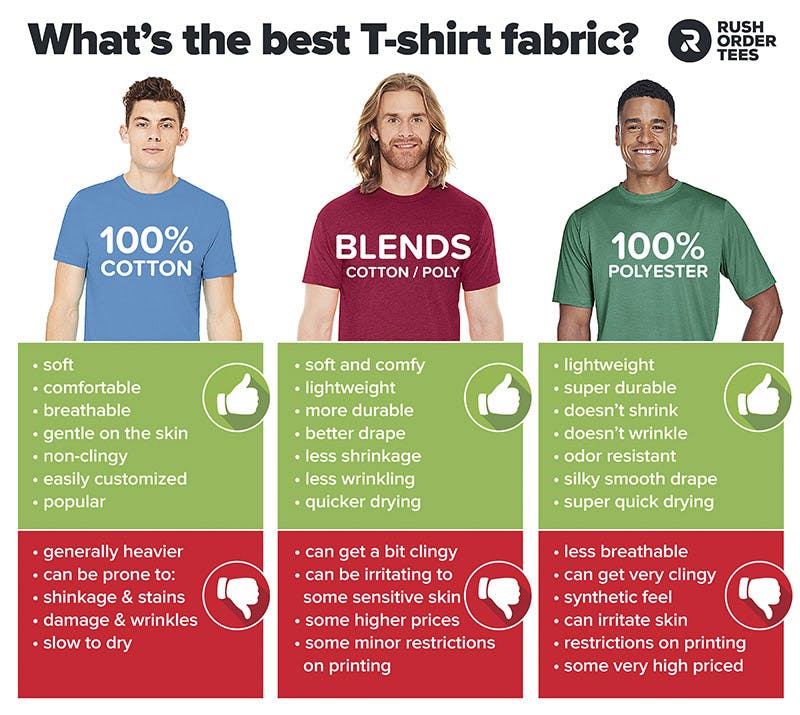Polyester shirts are durable and resistant to wrinkles, while cotton shirts are breathable and comfortable. In terms of fabric choice, polyester offers durability and wrinkle-resistance, while cotton provides breathability and comfort.
When choosing between polyester and cotton shirts, it ultimately comes down to personal preference and the specific needs of the individual. Polyester shirts are known for their longevity and resistance to wrinkles, making them a popular choice for those seeking low-maintenance clothing.
On the other hand, cotton shirts are highly breathable and offer superior comfort, making them ideal for warmer climates or individuals who prioritize comfort above all else. Both polyester and cotton shirts have their own advantages and drawbacks, so it’s important to consider factors such as climate, personal comfort, and desired style when making a decision. Whether it’s polyester or cotton, choosing a shirt that suits your needs and preferences will ensure optimal comfort and satisfaction.

Credit: merchize.com
Table of Contents
Introduction To Fabric Choices
Choosing between polyester and cotton shirts involves considering various factors such as comfort, durability, and breathability. Polyester shirts are known for their wrinkle resistance and moisture-wicking properties, making them ideal for active wear. On the other hand, cotton shirts are breathable and offer a soft, natural feel against the skin, making them a popular choice for everyday wear.
| Introduction to Fabric Choices | |
| Cotton Shirts: A Staple Wardrobe Piece | Polyester Shirts: The Modern Alternative |
| Cotton shirts are known for their breathability and natural feel. They are comfortable and great for everyday wear. They are versatile and can be dressed up or down easily. | Polyester shirts are durable and resistant to wrinkles and shrinking. They are easy to care for and often have moisture-wicking properties, making them ideal for sports and outdoor activities. |
Historical Context
In the historical context of fashion, polyester and cotton shirts have played significant roles. Polyester shirts gained popularity in the mid-20th century due to their wrinkle-resistant and durable nature. On the other hand, cotton shirts have been a timeless classic, offering breathability and comfort, tracing back to ancient civilizations.
Both fabrics have made lasting impacts on the evolution of garment manufacturing and consumer preferences.
| Historical Context |
|---|
| The Evolution of Cotton in Fashion: Cotton has been a staple in clothing for centuries, known for its breathability and comfort. The Rise of Polyester and Synthetic Fibers: Polyester emerged as a popular alternative due to its durability and wrinkle resistance. Synthetic fibers gained traction for their affordability and easy maintenance. The versatility of cotton and the innovations in polyester continue to shape the choices consumers make when selecting shirts. |
Material Properties
Cotton is a natural and breathable fabric, making it a popular choice for shirts. It allows air to circulate, keeping the wearer cool and comfortable. Cotton shirts are also absorbent, which means they can wick away moisture from the body. This makes them suitable for hot and humid climates.
On the other hand, polyester shirts are known for their strength and resistance. They are durable and can withstand wear and tear better than cotton shirts. Polyester is also a wrinkle-resistant fabric, making it a convenient option for those who prefer low-maintenance clothing.
Comfort Factors
Polyester shirts are known for their durability and wrinkle-resistant properties, making them a popular choice for those who prioritize ease of maintenance. However, cotton shirts are softer and more breathable, providing greater comfort during hot weather. When considering comfort factors, the choice between polyester and cotton ultimately depends on personal preference and the intended use of the shirt.
Polyester and cotton shirts have different comfort factors that can influence your choice. When it comes to breathability, cotton shirts are the winner. They allow better airflow, keeping you cool and comfortable, especially in hot weather. Polyester shirts, on the other hand, may not be as breathable and can trap heat, making you feel sweaty. For individuals with sensitive skin, cotton shirts are the safer option. Cotton is a natural fiber that is gentle on the skin and less likely to cause irritation or allergic reactions. Polyester shirts, being synthetic, can be rougher and less comfortable for those with sensitive skin. In terms of fit and wearability, both polyester and cotton shirts have their advantages. Polyester shirts tend to have more stretch and can be more form-fitting, while cotton shirts offer a more relaxed and breathable fit. Ultimately, the choice between polyester and cotton shirts depends on personal preferences and the specific needs of the individual. Consider factors such as breathability and skin sensitivity to make an informed decision.Durability And Maintenance
Polyester shirts offer excellent durability and low maintenance, making them a practical choice for everyday wear. On the other hand, cotton shirts are known for their natural breathability and comfort, but may require more care to maintain their shape and color over time.
Choose the fabric that best suits your needs and lifestyle.
| Cotton | Polyester | |
|---|---|---|
| Lifespan | Cotton shirts tend to have a shorter lifespan than polyester shirts. | Polyester shirts are more durable and can last longer than cotton shirts. |
| Care Instructions | Cotton shirts require more attention when it comes to washing and ironing. | Polyester shirts are easier to care for and require less maintenance. |
| Ease of Cleaning | Cotton shirts can be difficult to clean and may require pre-treatment for stains. | Polyester shirts are stain-resistant and can be easily cleaned. |

Credit: threadsy.com
Environmental Impact
| Environmental Impact |
|---|
| Sustainability of Cotton Production |
Polyester and cotton shirts have different environmental impacts. Cotton production requires a lot of water and pesticides, which can have negative effects on the environment and human health. However, cotton can be produced sustainably through organic and fair trade practices, which promote soil health and reduce chemical use. On the other hand, polyester production requires less water and chemicals, but it is made from non-renewable resources and does not biodegrade easily. Polyester also contributes to microplastic pollution in oceans and can release harmful chemicals during washing. Overall, both materials have environmental concerns, but it is important to consider the sustainability of cotton production and the potential for recycling polyester to reduce their impact.
Cost Considerations
Polyester and cotton shirts come with different cost considerations. While polyester shirts tend to be more affordable upfront, cotton shirts are generally more durable and have a longer lifespan, making them a cost-effective choice in the long run. Consider your budget and priorities when deciding between the two materials.
| Cost Considerations |
| Price Comparison: |
| Polyester shirts tend to be less expensive than cotton shirts. Due to the lower cost of production, polyester fabrics are generally more affordable. Cotton shirts, on the other hand, can be pricier as cotton is a natural fiber and requires more resources and labor to produce. If you are on a tight budget, opting for polyester shirts might be a more cost-effective choice. |
| Long-Term Value: |
| When considering long-term value, cotton shirts often outshine polyester shirts. Cotton is known for its durability and longevity, especially when properly cared for. Cotton fabrics tend to maintain their quality and appearance over time, making them a reliable investment. Polyester shirts, although affordable, may not last as long and may show signs of wear and tear sooner. |
Use Cases And Versatility
When choosing between polyester and cotton shirts, it is important to consider their use cases and versatility.
Polyester shirts are commonly used for casual attire due to their durability and resistance to wrinkles. They are suitable for everyday wear and can withstand frequent washing without losing their shape.
Cotton shirts, on the other hand, are often preferred for professional attire as they provide a more polished and professional look. They are comfortable to wear and allow for better breathability, making them suitable for all-day wear in various climates.
When it comes to different climates, polyester shirts are known for their moisture-wicking properties, making them ideal for hot and humid conditions. They help to keep the body cool and dry by drawing sweat away from the skin.
Cotton shirts, on the contrary, are more breathable and better suited for warmer climates as they allow air to circulate more freely, providing a cooling effect. However, they may not be as effective in moisture management as polyester.
Ultimately, the choice between polyester and cotton shirts depends on personal preference, the intended use, and the climate in which they will be worn.
Consumer Preferences And Trends
Consumer preferences and trends show that cotton shirts are still the preferred choice over polyester shirts due to their natural material, breathability, and durability. Despite being cheaper, polyester shirts are often perceived as less comfortable and less environmentally friendly.
| Polyester Shirts | Cotton Shirts |
| Known for durability and crease resistance. | Natural breathability and comfort. |
| Popular in sportswear due to moisture-wicking properties. | Preferred for casual wear and sensitive skin. |
| Less prone to shrinking and fading. | May shrink and fade over time. |

Credit: www.rushordertees.com
Frequently Asked Questions
Is Polyester Or Cotton Better For Shirts?
Polyester is better for durability and wrinkle resistance, while cotton is more breathable and comfortable. It depends on your priorities.
Are 100% Polyester Shirts Good?
Yes, 100% polyester shirts are good. They are durable, wrinkle-resistant, and quick-drying. They also offer moisture-wicking properties, making them ideal for sports and outdoor activities.
What Wears Better Cotton Or Polyester?
Cotton wears better than polyester due to its breathability, comfort, and durability. Polyester may be more resistant to wrinkles and fading.
Are Polyester Shirts Better Than Cotton In Summer?
Polyester shirts are better than cotton in summer because they are lightweight, breathable, and wick away moisture. They dry quickly, making them ideal for hot weather. Additionally, polyester resists wrinkles and retains its shape, making it a low-maintenance option for summer clothing.
Conclusion
After considering the differences between polyester and cotton shirts, it ultimately comes down to personal preference. While polyester shirts may be more durable and resistant to wrinkles and shrinkage, cotton shirts offer better breathability and a softer feel. Both have their own advantages and disadvantages.
It’s important to choose the material that best suits your needs and comfort. So, next time you’re shopping for shirts, keep these factors in mind and make an informed decision.
